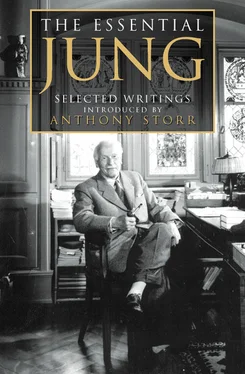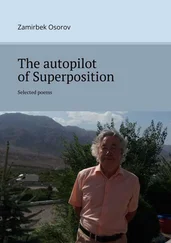The construction of a collectively suitable persona means a formidable concession to the external world, a genuine self-sacrifice which drives the ego straight into identification with the persona, so that people really do exist who believe they are what they pretend to be. The “soullessness” of such an attitude is, however, only apparent, for under no circumstances will the unconscious tolerate this shifting of the centre of gravity. When we examine such cases critically, we find that the excellence of the mask is compensated by the “private life” going on behind it. The pious Drummond once lamented that “bad temper is the vice of the virtuous.” Whoever builds up too good a persona for himself naturally has to pay for it with irritability. Bismarck had hysterical weeping fits, Wagner indulged in correspondence about the belts of silk dressing-gowns, Nietzsche wrote letters to his “dear lama,” Goethe held conversations with Eckermann, etc. But there are subtler things than the banal lapses of heroes. I once made the acquaintance of a very venerable personage – in fact, one might easily call him a saint. I stalked round him for three whole days, but never a mortal failing did I find in him. My feeling of inferiority grew ominous, and I was beginning to think seriously of how I might better myself. Then, on the fourth day, his wife came to consult me … Well, nothing of the sort has ever happened to me since. But this I did learn: that any man who becomes one with his persona can cheerfully let all disturbances manifest themselves through his wife without her noticing it, though she pays for her self-sacrifice with a bad neurosis.
These identifications with a social role are a very fruitful source of neuroses. A man cannot get rid of himself in favour of an artificial personality without punishment. Even the attempt to do so brings on, in all ordinary cases, unconscious reactions in the form of bad moods, affects, phobias, compulsive ideas, backslidings, vices, etc. The socially “strong man” is in his private life often a mere child where his own states of feeling are concerned; his public discipline (which he demands quite particularly of others) goes miserably to pieces in private. His “happiness in his work” assumes a woeful countenance at home; his “spotless” public morality looks strange indeed behind the mask-we will not mention deeds, but only fantasies, and the wives of such men would have a pretty tale to tell. As to his selfless altruism, his children have decided views about that.
To the degree that the world invites the individual to identify with the mask, he is delivered over to influences from within. “High rests on low,” says Lao-tzu. An opposite forces its way up from inside; it is exactly as though the unconscious suppressed the ego with the very same power which drew the ego into the persona. The absence of resistance outwardly against the lure of the persona means a similar weakness inwardly against the influence of the unconscious. Outwardly an effective and powerful role is played, while inwardly an effeminate weakness develops in face of every influence coming from the unconscious. Moods, vagaries, timidity, even a limp sexuality (culminating in impotence), gradually gain the upper hand.
The persona, the ideal picture of a man as he should be, is inwardly compensated by feminine weakness, and as the individual outwardly plays the strong man, so he becomes inwardly a woman, i.e., the anima, for it is the anima that reacts to the persona. But because the inner world is dark and invisible to the extraverted consciousness, and because a man is all the less capable of conceiving his weaknesses the more he is identified with the persona, the persona’s counterpart, the anima, remains completely in the dark and is at once projected, so that our hero comes under the heel of his wife’s slipper. If this results in a considerable increase of her power, she will acquit herself none too well. She becomes inferior, thus providing her husband with the welcome proof that it is not he, the hero, who is inferior in private, but his wife. In return the wife can cherish the illusion, so attractive to many, that at least she has married a hero, unperturbed by her own uselessness. This little game of illusion is often taken to be the whole meaning of life.
The ideal individual, one might postulate, would be consistently the same whatever the circumstances. In practice, most human beings adopt attitudes in public which are different from their attitudes in private. There is a dissociation of personality into “outer” and “inner”; into “mask” and “soul.” Jung affirms that, in men, the inner personality or soul is feminine, and represented as such by female figures in dreams and fantasies; whereas the opposite is true for women.
(The words preceding “q.v.” in the following passage are defined by Jung elsewhere in “Definitions.”)
From “Definitions” Psychological Types, CW 6, pars. 797–811
48. SOUL [Psyche, personality, persona, anima]. I have been compelled, in my investigations into the structure of the unconscious, to make a conceptual distinction between soul and psyche. By psyche I understand the totality of all psychic processes, conscious as well as unconscious. By soul, on the other hand, I understand a clearly demarcated functional complex that can best be described as a “personality.” In order to make clear what I mean by this, I must introduce some further points of view. It is, in particular, the phenomena of somnambulism, double consciousness, split personality, etc., whose investigation we owe primarily to the French school, that have enabled us to accept the possibility of a plurality of personalities in one and the same individual.
[Soul as a functional complex or “personality”]
It is at once evident that such a plurality of personalities can never appear in a normal individual. But, as the above-mentioned phenomena show, the possibility of a dissociation of personality must exist, at least in the germ, within the range of the normal. And, as a matter of fact, any moderately acute psychological observer will be able to demonstrate, without much difficulty, traces of character-splitting in normal individuals. One has only to observe a man rather closely, under varying conditions, to see that a change from one milieu to another brings about a striking alteration of personality, and on each occasion a clearly defined character emerges that is noticeably different from the previous one. “Angel abroad, devil at home” is a formulation of the phenomenon of character-splitting derived from everyday experience. A particular milieu necessitates a particular attitude (q.v.). The longer this attitude lasts, and the more often it is required, the more habitual it becomes. Very many people from the educated classes have to move in two totally different milieus – the domestic circle and the world of affairs. These two totally different environments demand two totally different attitudes, which, depending on the degree of the ego’s identification (q.v.) with the attitude of the moment, produce a duplication of character. In accordance with social conditions and requirements, the social character is oriented on the one hand by the expectations and demands of society, and on the other by the social aims and aspirations of the individual. The domestic character is, as a rule, moulded by emotional demands and an easy-going acquiescence for the sake of comfort and convenience; whence it frequently happens that men who in public life are extremely energetic, spirited, obstinate, wilful and ruthless appear good-natured, mild, compliant, even weak, when at home and in the bosom of the family. Which is the true character, the real personality? This question is often impossible to answer.
Читать дальше












